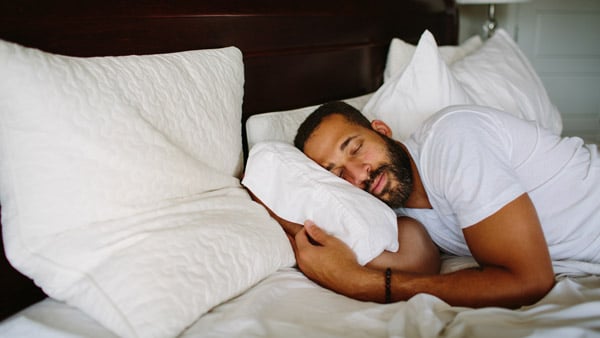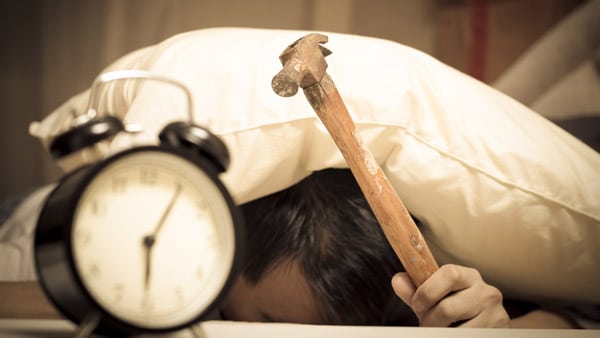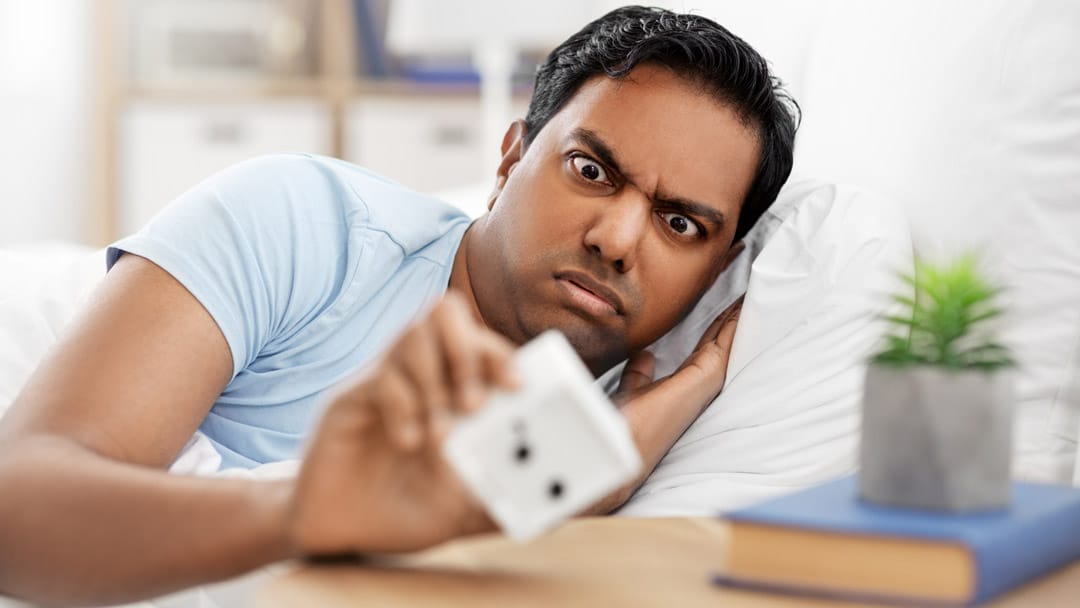Is the snooze button bad for your health?
It’s a familiar story: your alarm blares, you’re ripped away from the sweet embrace of an amazing dream and jolted back to reality. You groan, fumble to find your phone, hit the snooze button as fast as humanly possible to get a few more minutes of sleep and resume your happy dream. Only to have the same thing happen again 9 minutes later.
While occasionally snagging those extra 9, 18, or 27 minutes of shut-eye isn’t so bad for you, having a daily battle with your alarm can have some negative health effects like fatigue and a decrease in mental clarity.
Here are six tips to help you stop hitting the snooze button and get your day started on a less alarming (pun intended) note:
Socially distance from your alarm clock
When you’re first jolted awake by your alarm, it’s almost too easy to flail an arm and hit snooze. Make it harder to go back to sleep by moving your alarm out of arms’ reach. If you have to make the trek across your room to shut it off, you’re already halfway to your morning coffee or shower.
Invest in a sunrise alarm clock
Sunshine, or the lack of sunshine, signals to your body when you should prepare to sleep or prepare to wake up. If your partner is on a different sleep schedule than you, or if you have dark curtains, you may want to try a wake-up light.
Sunrise alarm clocks gradually brighten, mimicking a sunrise, and trigger your brain to remember that you’re built to wake up naturally with the sun. And while they do eventually provide an audio sound as well, by then, your body has been biologically cued to get up and seize the day—so no blaring surprises.
Stimulate your sense of smell
For some, the morning coffee smell is enough to get them out of bed, so a programmable coffee maker is just the ticket. Set it up to start brewing five minutes before you need to get up. You can even try putting the coffee maker on the nightstand so you can sip your joe in bed before you tackle your day.
Let the smell of bacon compel you. Not that you want to have bacon every morning, but while you’re getting used to your new snooze button-free routine, you can try popping a tray of bacon into the oven the night before and set it to turn on 15 minutes before you need to get up. That way, the scent of bacon will draw your sleepy arse into the kitchen.
Add something new to your morning routine
For those who aren’t coffee connoisseurs, you can add other things to your morning routine that will excite you and make crawling out of bed much easier.
For example, plan a run with the guys. If you try to sleep in, they’ll call, text, or knock on your door.
Schedule a gym session, especially a pre-paid one. Missing out on going to the gym is one thing; missing out on a paid session with a trainer or group is something else.
Find a new sports radio show you’re into. Instead of hitting snooze, turn that puppy on and get your morning dose of the latest sports news.
Have morning sex. As long as your partner is into it, it’s a great way to start your day, get in a little cardio, and connect with your partner before you take off in different directions.
Use your smartphone
Sleep alarm apps track your movement while you’re sleeping, the different phases of your sleep cycle, and do some technological magic to figure out the optimal time for you to wake up in the morning.
The apps can even track things like snoring and sleep talking and provide analytics on your sleep activity.
There are lots of sleep alarm apps out there, but here are two of the most popular:
For more apps (including ones that are sleep-inducing through meditation, music, and sound), check out this list of recommended sleep apps.
Set a sleep goal

Creating a better wake-up routine can be as simple as looking at your sleep hygiene and finding ways to tweak your sleep habits.
Here are a few tips for better sleep hygiene:
Have a no-screen policy in your bedtime routine
Take the temptation of checking emails, sending that last text, or doing a social media scan out of your sleep equation 60 minutes before your intended “lights out.” This should help reduce stress and relax your brain more as you get ready to call it a night. The exception is if you’re using a sleep app.
Use blackout curtains and window coverings
Light plays a key role in keeping us awake! So keep your sleep space as dark as possible while you’re sleeping, and control the light in your room by using blackout curtains.
Declutter
Bedroom clutter causes anxiety, which can keep your brain working in overdrive. An easy fix? Clear out your sleep space by putting away any stray clothes, removing paperwork, and putting away anything on your nightstand that you don’t use on a daily basis.
Keep a routine
Set yourself up with an evening routine, and follow that structure every day as you unwind. That means doing all your things (brushing your teeth, having your pre-bed pee, locking up your house, etc.) in the same order. This will signal to your brain that you are ready to relax and sleep.
Snooze science 101: The sleep cycle & its nemesis

To understand the troubles of using the snooze button, you’ll want to know the different sleep cycles and the stages of sleep:
- Non-REM Sleep: This ranges from when you first start to nod off and could still easily be woken up to deep sleep when your body is doing the hard work around things like building bone and muscle.
- REM sleep: This is when your brain is highly active, and dreams might come into play. It’s also when your body is still being restored to peak condition. You’ll experience REM sleep several times throughout the night.
Often, your alarm will go off right at the tail-end of a REM cycle, which will shock and jump-start your system but leave you foggy and disoriented. If you’re a snooze-button-hitter, that process repeats several times. Not the most relaxing way to start your day!
In the long run, hitting the snooze button also confuses your system. Your body loses track of what time you want to wake up, which leads to more confusion and grogginess in the morning and added stress on your body—what scientists call “sleep inertia.”
Getting enough sleep is also essential in making sure you feel refreshed. For guys between 26 and 65, that’s between 7 to 9 hours of sleep each night.
What have you done to stop hitting the snooze button? Let us know in the comments below.


Yes
A good read to remind me of what I already was aware of but lost the importance of why
It’s all too easy to rely on that snooze button!
~Canadian Men’s Health Foundation team member